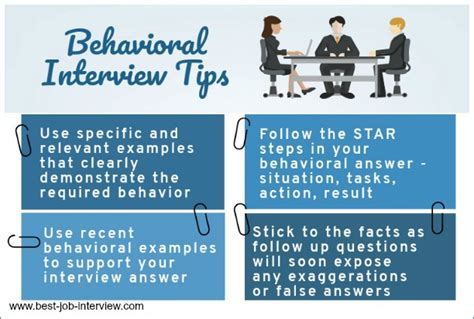Excelling In Behavioral Job Interviews: Your Guide

Behavioral job interviews are a popular way for employers to assess a candidate’s suitability for a role. They are designed to elicit information about past behavior that may be indicative of future performance. While they can be nerve-wracking, there are steps you can take to prepare and excel in these types of interviews.
1. Understand the Purpose of Behavioral Job Interviews
Behavioral job interviews are designed to assess how you have behaved in specific situations in the past. The belief is that past behavior is the best predictor of future behavior. The aim of these interviews is to determine if you have the necessary skills and qualities to succeed in the role for which you are applying.
2. Research the Company and Role
Before your interview, make sure you research the company and role thoroughly. This will help you to understand the company’s culture, values, and priorities. It will also give you an insight into the skills and qualities that are important for success in the role.
3. Prepare Examples
Prepare examples of situations where you demonstrated the skills and qualities that the company is looking for. Use the STAR method (Situation, Task, Action, Result) to structure your responses. This will help you to provide detailed and structured answers that are relevant to the question.
4. Practice Your Responses
Practice your responses to common behavioral interview questions. This will help you to feel more confident and comfortable during the interview. You can practice with a friend or family member, or record yourself and review your responses.
5. Use the Right Body Language
Body language is an important aspect of any job interview. Make sure you maintain good eye contact, sit up straight, and avoid fidgeting. This will help you to appear confident and engaged.
6. Show Your Personality
Employers are not only looking for candidates with the right skills and experience, but also those who will fit in with the company culture. Make sure you show your personality during the interview. This will help the interviewer to get a sense of who you are and whether you will be a good fit for the company.
7. Ask Questions
Don’t be afraid to ask questions during the interview. This will show that you are engaged and interested in the role. It will also give you an opportunity to learn more about the company, the role, and the expectations.
8. Follow Up
After the interview, make sure you follow up with a thank-you email or letter. This will help you to stand out from other candidates and show that you are serious about the role.
9. Conclusion
Behavioral job interviews can be challenging, but with the right preparation and mindset, you can excel in them. Make sure you understand the purpose of the interview, research the company and role, prepare examples, practice your responses, use the right body language, show your personality, ask questions, and follow up after the interview.
FAQs
What is a behavioral job interview?
A behavioral job interview is an interview technique that is designed to elicit information about past behavior that may be indicative of future performance.
What is the STAR method?
The STAR method is a structured approach to answering behavioral interview questions. It stands for Situation, Task, Action, and Result.
How do I prepare for a behavioral job interview?
To prepare for a behavioral job interview, research the company and role, prepare examples, practice your responses, use the right body language, show your personality, ask questions, and follow up after the interview.
What are employers looking for in a behavioral job interview?
Employers are looking for candidates who have the necessary skills and qualities to succeed in the role, and who will fit in with the company culture.
Is it important to follow up after a behavioral job interview?
Yes, it is important to follow up after a behavioral job interview. A thank-you email or letter can help you to stand out from other candidates and show that you are serious about the role.
